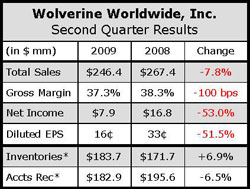Wolverine World Wide, Inc. reported a sharp decline in Q2 earnings due to restructuring charges, but the company still lifted its full-year adjusted earnings outlook due to the strength in its core brands and signs that the “quality” of order backlog is improving.

“Weve been hearing anecdotally from our sales force for the first two quarters this year that in this environment retailers are placing orders only if they really believe they will take shipments,” said company CFO Donald Grimes on a conference call with analysts. “This is in contrast to the rate of cancelled orders in the last half of 2008, particularly Q4, that was much higher than our historical average.”
One going challenge, Grimes noted, was that retailers are continuing to place orders closer to their date of delivery and this has “manifested itself in dramatically shorter customer request lead time.” In the most recent quarter, the average order to shipment lead time based on customers requested ship date decreased approximately five weeks versus Q208. The average requested lead time for future orders decreased almost seven weeks versus the prior year.
“Extremely cautious retailers are relying more and more on vendors to carry inventory to fill orders that historically would have been placed prior to or at the beginning of the season,” said Grimes. ” In the second quarter, more than two thirds of the orders we received were classified as at once orders versus a little above half in the prior year second quarter.” Nonetheless, despite this at-once push, he said the better-than-average quality backlog, along with sustainable improvements in its order fulfillment rate, makes WWW “cautiously optimistic regarding the back half of the year.”
Excluding restructuring and other costs, the company now expects 2009 profit of $1.55 to $1.73 per share. Its prior forecast was for earnings of $1.50 to $1.70 per share.
The 7.8% decline in Q2 revenues largely reflects the negative impact of changes in foreign exchange rates due to a stronger U.S. dollar. In constant currency, revenues declined 3.1% as an “excellent performance” in the U.S., driven primarily by the Merrell brand and by the acquisition of the Chaco, was offset by challenging trading conditions in many major global markets.
In its Outdoor Group, the Merrell U.S. and Patagonia Footwear businesses “had a very strong quarter” with both up double digits. Company President and CEO Blake Kruger said Merrell is benefiting as retailers have pared down the number of brands theyre carrying. He noted that Merrell's increase didnt come from new distribution, but from “excellent sell through” at existing doors. Sporting goods and independents performed slightly better than outdoor specialty and department stores for the brand. The sales performance in the quarter was spread also across mens and womens. Kruger said Merrell apparel “is now more aligned with the DNA and strengths of Merrell footwear,” and new products for trail running, sun protection and commuter cycling in the 2010 spring product line have been “very well received” by retailers.
Patagonia Footwear “continues to gain traction and achieved a high double digit revenue increase for the quarter.” This growth was fueled by success in the brands top accounts, which are experiencing strong sell-throughs of key models in the performance, lifestyle and surf category. The integration of Chaco, acquired in January 2009, was accelerated and early efforts were focused on operational improvements, especially product delivery and quality. Product sell through has remained strong and the reaction of retailers to its spring 2010 line has been very positive.
The Hush Puppies Group exceeded internal forecasts but was still down high-single-digits. Revenue was up low-single-digits in constant dollars. The brand is making progress in moving up market in North America, and two full-price stores are opening in Montreal to support this positioning.
Cushe, a U.K.-based brand also acquired in January and part of the Hush Puppies Group, has seen “very positive” sell-throughs at influential retailers in North America and the U.K. have been very positive although the brand is “still in its infancy.”
In the Heritage Brands Group, Harley-Davidson and Sebago both posted sales increases for the quarter. However, these increases were offset by challenges for the CAT business, especially in Europe, and overall group sales were down mid-single-digits on a constant currency basis.
In the Wolverine Footwear Group, revenue declined in the quarter, but earnings performance was “solid” and exceeded expectations.
WWW also noted that its owned stores showed a low-single-digit comp gain in the quarter and has been benefiting from move toward a narrow and deep strategy in key assortments.
The bottom line included a charge of $7.9 million, or 11 cents per share, related to a program focused on generating significant efficiencies across the business. Adjusting for these charges, fully diluted earnings in the quarter were 27 cents per share, compared to 33 cents in the prior year.
WWW anticipates significantly lower product costs in the last half of the year and still expects full year gross margin to be approximately flat to the prior year.















